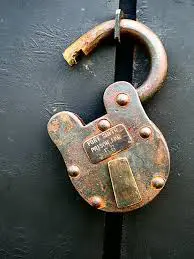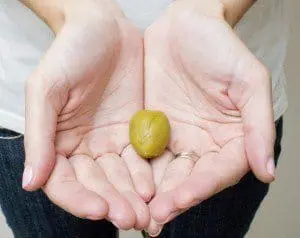While the proficiency to open doors, latches, and gates may be one necessary to an older child, once a toddler masters these skills you may have yourself a problem. The independence, tenacity, and curiosity of toddlers make for astonishingly adept escape artists which have led to minor heart attacks for plenty of parents. Unfortunately, sometimes toddler escapes end in more than just minor heart attacks. For example, in 2015 a 3-year-old Toronto boy escaped his home in the middle of the night and despite a frantic neighborhood-wide search involving hundreds of people, the boy froze to death before being found. Tragedies such as this always prompt two sorts of commentary, the folks who have kids and can’t fathom the pain this poor family must be in, and the finger-pointers, who always think something could have been done to prevent this. So, question is, can anything be done to stop a determined toddler from escaping while you, say, sleep?
Lock it, latch it, and high.
You know that scene from Conspiracy Theory, where the suggested-crazy Jerry has an army of locks on his door? Yeah, your door should be sort of like that. The thing about toddlers is they learn— and fast. Having multiple locks or latches on exterior and no-no room doors provides extra protection as well as will take longer for your toddler to undo if they master how to do so. For example, your front door could have a door knob lock, a deadbolt, and a high set chain lock. This means even if your clever, clever child got a chair or used a broom stick to undo the chain lock, they’d still have to twist the deadbolt latch, and figure out the knob lock and chances are you’d catch them before they got that far. Don’t forget sliding doors and large windows either. At 3, one of our children unlocked his second-story bedroom window, climbed onto the back porch, and then down the lattice to the ground.
Remember that toddler escapes can happen while not at home as well. Keep child locks on your vehicle doors and have an extra key in your wallet or purse in case your child ever decides locking you out is more fun than escaping.
Sound the alarm.
Assuming you sleep, just slowing your toddler’s escapes down so you can catch them won’t always be effective. In this case, you want to make escapes noisy. You can purchase door alarms which install as easy as peel and stick for under 10 bucks a piece, but if you’d like to give some fairies wings, bells work well as well. A string of door bells can also be pretty decorative, so you can guard against escape without looking paranoid to those that don’t know the joys of a self-sufficient and resolute child. Heck, if you’re a hard sleeper you may want to do both.
Listen carefully.
On top of alarms or bells that baby monitor you likely haven’t even gotten around to putting away can become a toddler monitor. At night it helps make escape alerts sound louder in your bedroom and during the day it can help you be able to concentrate on other things such as housework without having to look around every 30-seconds because you can hear the mischief. Extra tip: Beware a silent child.
Be clear.
You can also take a proactive approach to toddler escapes by talking to your toddler about it. Depending on your child’s age, you can either just have going outside without an adult be a no-no that is enforced the same way that say finger painting on the couch cushion is for younger toddlers, or you can explain the dangers of going out alone with an older toddler.
Never forget.
Keep in mind that all of the above is useless if you don’t use it. While undoing 3 to 4 locks can be a pain, and remembering to power on an alarm if you turn it off to do something like carry in groceries can be easy to forget (another advantage of bells) there’s no point in these safety measures if you don’t use them and a pain in the butt is way easier than a broken heart from a missing, hurt (or worse) child.





